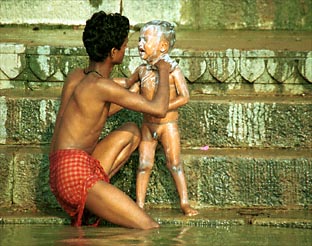
Varanasi, page 4 of 4

After the boat trip, which lasted three hours, our riksja driver took us to eat
some breakfast in a befriended (with him!) 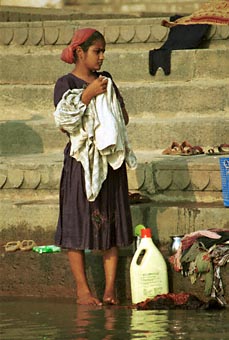 restaurant.
He explained about Varanasi and about the Hindu temple tour on which he wanted to take us.
He knew exactly what he wanted from life: first earn enough money to buy his own riksja,
then buy two more and finely he wanted a secure job with the Government (which he could
pay by then), because he thought in the end he wouldn’t like so much the riksja
driving any more. I can understand that! He took a lot of time to explain us things about
India and he didn’t want us to be disappointed. He really wanted us to understand and
I appreciated that very much. Money was important to him, but he had much pride also and
he liked to be seen as an individual. We visited a lot of temples of which I didn’t
put many pictures on this page, because most of the time you weren’t allowed to take
pictures and when you are, I didn’t always feel the picture to convey any of the
atmosphere I experienced in this temples.
restaurant.
He explained about Varanasi and about the Hindu temple tour on which he wanted to take us.
He knew exactly what he wanted from life: first earn enough money to buy his own riksja,
then buy two more and finely he wanted a secure job with the Government (which he could
pay by then), because he thought in the end he wouldn’t like so much the riksja
driving any more. I can understand that! He took a lot of time to explain us things about
India and he didn’t want us to be disappointed. He really wanted us to understand and
I appreciated that very much. Money was important to him, but he had much pride also and
he liked to be seen as an individual. We visited a lot of temples of which I didn’t
put many pictures on this page, because most of the time you weren’t allowed to take
pictures and when you are, I didn’t always feel the picture to convey any of the
atmosphere I experienced in this temples.
We saw many different temples; each god had his or her own temple. And each god has also different ways of showing him- or herself, so you have plenty of possibilities. This story doesn’t even attempt to give an impression of Hinduism, so please don’t be offended when I say some terrible wrong things, but do me the favor of e-mailing them so I can correct myself!
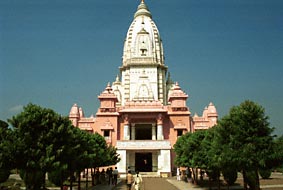
The first temple we saw was the Sree Vishwanath
temple. The colors are incredible, pink and white, you would get arrested in Holland only
for designing a church like that. The temple is open for everybody, so we enter and we
watch with curiosity the jumping up to hit the clapper of the big bell that 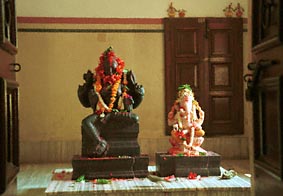 hangs from the
roof. Even very old women, totally warped by old age, try to jump (in vain) to the
clapper. We don’t have difficulties in tuning in with this behavior and when nobody
looks, Jacques jumps (only a small distance to cover) and hits the clapper with full
force. Nobody looked, but everybody heard I presume! This will really bring us a lot of
luck! We see a lot of ‘long-life-flowers’, small orange flowers, which
are essential for earning a long life. The gods are covered with these flowers, and also
with lots of orange paint and so on, it really looked like idol gods to us!
hangs from the
roof. Even very old women, totally warped by old age, try to jump (in vain) to the
clapper. We don’t have difficulties in tuning in with this behavior and when nobody
looks, Jacques jumps (only a small distance to cover) and hits the clapper with full
force. Nobody looked, but everybody heard I presume! This will really bring us a lot of
luck! We see a lot of ‘long-life-flowers’, small orange flowers, which
are essential for earning a long life. The gods are covered with these flowers, and also
with lots of orange paint and so on, it really looked like idol gods to us!
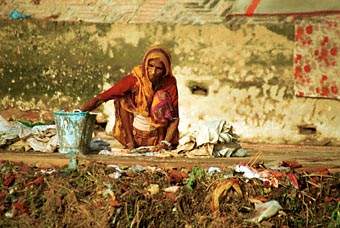
In the next temple we see again a lot of gods
covered with these flowers and people performing all kind of rituals with flowers and 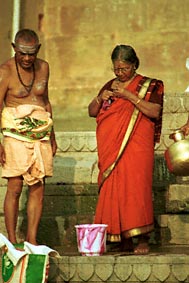 candles
and small cups with holy liquids and so on. The monkey god is offered bananas and
coconuts, gifts that are taken by a couple of holy men who are allowed within the center
of the temple.
candles
and small cups with holy liquids and so on. The monkey god is offered bananas and
coconuts, gifts that are taken by a couple of holy men who are allowed within the center
of the temple.
It wasn’t allowed to make pictures in this
real ‘monkey temple’, the temple which is dedicated to the monkey god. Indians
always get mixed up with tourist talking about ‘monkey temples’ because the
tourists see monkeys walking over there, and the Indians don’t understand what they
are talking about because this isn’t the Monkey God! The rituals seem to be very
free; you just do as you like. But for sure this is not completely true? I see some
praying texts; they look a bit like timetables of the metro 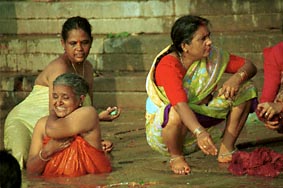 of Paris. You can read them aloud (when you
understand Hindu that is). However, I think the service is not so rigid as many of our
Christian services. And certainly there is no sermon, which is already a big improvement!
I always think it very strange when somebody without much (or any) life experience and
self-knowledge is telling you how to think and behave. Furthermore I didn’t feel
expelled, even as a complete stranger and unbeliever I felt accepted, as if they felt even
I was having my own private ceremony. Which in a way I was.
of Paris. You can read them aloud (when you
understand Hindu that is). However, I think the service is not so rigid as many of our
Christian services. And certainly there is no sermon, which is already a big improvement!
I always think it very strange when somebody without much (or any) life experience and
self-knowledge is telling you how to think and behave. Furthermore I didn’t feel
expelled, even as a complete stranger and unbeliever I felt accepted, as if they felt even
I was having my own private ceremony. Which in a way I was.
Our riksja driver shows us a couple of different
Hindu temples, each of them completely different. I am used to churches, of which you have
in general two kinds: reformed and catholic. Of course one church is much more beautiful 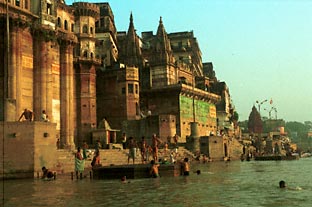 or much older or both than others, and there is a difference
between old and modern churches, but the general idea is quite the same. Now you
can’t say I have grasped the general idea of Hindu temples, but I think the principal
idea is that they all are different. I even think I know why: each God is different and so
they have different temples. That is also why they have sometimes so many arms and heads:
just to show different character aspects. You are not just one being, you are many. And so
are the Gods. And then the Gods have also different moods and show themselves in a
different way. This makes it rather complicated!
or much older or both than others, and there is a difference
between old and modern churches, but the general idea is quite the same. Now you
can’t say I have grasped the general idea of Hindu temples, but I think the principal
idea is that they all are different. I even think I know why: each God is different and so
they have different temples. That is also why they have sometimes so many arms and heads:
just to show different character aspects. You are not just one being, you are many. And so
are the Gods. And then the Gods have also different moods and show themselves in a
different way. This makes it rather complicated!
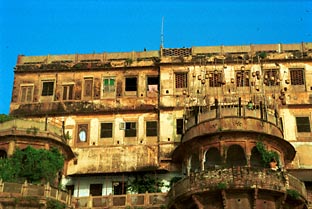 In one of the temples, the Tulsi Manas temple, everything is very
serious with dark colors and strict patterns. But when Mass - or however you call it -
starts, you hear an enormous cacophony of people praying and bells ringing. Later on we
found out they even have an upper floor with animated dolls performing scenes from the
Hindu mythology. It doesn’t look like Christian church at all (anyway Hindu temples
never do!), more like an amusement park like ‘De Efteling’ (fairytale park in
Holland).
In one of the temples, the Tulsi Manas temple, everything is very
serious with dark colors and strict patterns. But when Mass - or however you call it -
starts, you hear an enormous cacophony of people praying and bells ringing. Later on we
found out they even have an upper floor with animated dolls performing scenes from the
Hindu mythology. It doesn’t look like Christian church at all (anyway Hindu temples
never do!), more like an amusement park like ‘De Efteling’ (fairytale park in
Holland).
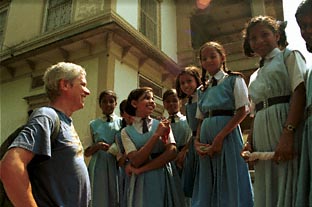 The last temple we saw only comprised the map of India in marble relief; this
temple was dedicated to Gandhi. In front of the temple we saw some schoolgirls, who were
extremely interested in Jacques (and vice versa of course!). Children of the higher castes
went to school without much money problems, and these children were in fact the only
Indian people with whom we had contacts that hadn’t anything to do with money. They
were a bit shy, but very curious and liked to meet this strange European people. Jacques,
with his white hair, must have looked like a real European Guru! They liked very much to
touch him, it is a pity I don’t have a picture of that time in Agra (Amber Fort),
when he shaked hands with at least two complete school classes, who lined up it seemed
just for this purpose! Some presidential ambitions maybe, Jacques??
The last temple we saw only comprised the map of India in marble relief; this
temple was dedicated to Gandhi. In front of the temple we saw some schoolgirls, who were
extremely interested in Jacques (and vice versa of course!). Children of the higher castes
went to school without much money problems, and these children were in fact the only
Indian people with whom we had contacts that hadn’t anything to do with money. They
were a bit shy, but very curious and liked to meet this strange European people. Jacques,
with his white hair, must have looked like a real European Guru! They liked very much to
touch him, it is a pity I don’t have a picture of that time in Agra (Amber Fort),
when he shaked hands with at least two complete school classes, who lined up it seemed
just for this purpose! Some presidential ambitions maybe, Jacques??
This concludes our visit to Varanasi. Or really
it was concluded by our try to leave the country on 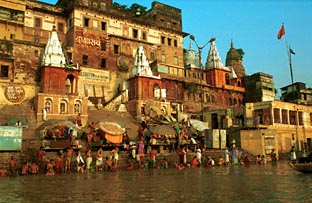 our
way to Nepal, which took a couple of hours longer than planned. Which isn’t unusual
at all, and so we didn’t worry. Just we had to wait a couple of hours for the bus and
we had to wait in a kind of building that would qualify more for demolishing than for
finishing – it was in the process of being built however I think (for the last ??
years)!
our
way to Nepal, which took a couple of hours longer than planned. Which isn’t unusual
at all, and so we didn’t worry. Just we had to wait a couple of hours for the bus and
we had to wait in a kind of building that would qualify more for demolishing than for
finishing – it was in the process of being built however I think (for the last ??
years)!
But we got on a bus and had a nice view from the
bus directly on the small shops - maximum width seemed to be two meters - and all the
booths, wooden structures that looked as if they could break down any moment. Every
village had a long row of garage-like buildings next to the road, which were transformed
into shops by opening the front rolling 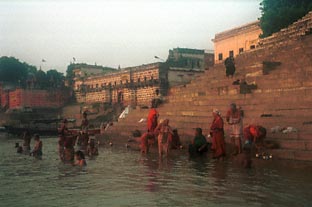 shutters. You could get a shave and a
haircut, buy anything you want: big bunches of bananas, beautiful arranged combinations of
fruit, tobacco to chew on, rolling-pins, colanders, enormous metal jugs, one-time-use-only
flower-pot-like thee-cup pottery (sold only by the hundred I think, judging from the huge
pyramids I saw), plastic buckets in all existing colors, even some souvenirs for tourist
(but not many) and get your clothes and shoes mended at shops with Singer sewing machines
and more obscure machinery dating from the beginning of this century or so. People were
working, but very relaxed, while talking to passers-by and to neighbor shop owners.
shutters. You could get a shave and a
haircut, buy anything you want: big bunches of bananas, beautiful arranged combinations of
fruit, tobacco to chew on, rolling-pins, colanders, enormous metal jugs, one-time-use-only
flower-pot-like thee-cup pottery (sold only by the hundred I think, judging from the huge
pyramids I saw), plastic buckets in all existing colors, even some souvenirs for tourist
(but not many) and get your clothes and shoes mended at shops with Singer sewing machines
and more obscure machinery dating from the beginning of this century or so. People were
working, but very relaxed, while talking to passers-by and to neighbor shop owners.